HEPARIN - INJECTION
PHONETIC PRONUNCIATION: (HEP-a-rin)
GENERIC NAME(S): heparin sodium,porcine
Uses
USES: This medication is used to prevent and treat blood clots. It may be used to prevent and treat blood clots in the lungs/legs (including in patients with atrial fibrillation). It may be used to treat certain blood clotting disorders. It may also be used to prevent blood clots after surgery, during dialysis, during blood transfusions, when collecting blood samples, or when a person is unable to move for a long time. Heparin helps to keep blood flowing smoothly by making a certain natural substance in your body (anti-clotting protein) work better. It is known as an anticoagulant.
How to use HEPARIN - INJECTION
HOW TO USE: Read the Patient Information Leaflet if available from your pharmacist before you start using heparin and each time you get a refill. If you have any questions, ask your doctor or pharmacist. This medication is given by injection into a vein or under the skin as directed by your doctor. Do not inject this medication into a muscle. The dosage and how often you use it are based on your medical condition, weight, and response to treatment. Heparin comes in many strengths. Serious (sometimes fatal) injuries have occurred when the wrong strength was used. Check that you are using the correct strength and dose before injecting this medication. If you are injecting heparin into a vein, flush the catheter/line with normal saline before and after infusing drugs that interact with heparin such as doxorubicin, droperidol, ciprofloxacin, and mitoxantrone. If you are injecting heparin under the skin, clean the injection site with rubbing alcohol. Change the injection site each time to lessen injury under the skin. If you are giving this medication to yourself at home, learn all preparation and usage instructions from your health care professional. Before using, check this product visually for particles or discoloration. If either is present, do not use the liquid. Learn how to store and discard medical supplies safely. Use this medication regularly to get the most benefit from it. To help you remember, use it at the same times each day. Your doctor may direct you to switch to an anticoagulant taken by mouth (such as warfarin). Use this medication and any new medication exactly as directed by your doctor.
Side Effects
Precautions
Interactions
Overdose
Images
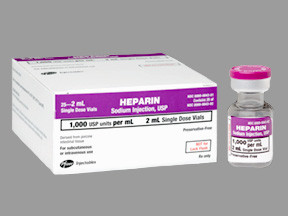
- color
- colorless
- shape
- imprint

- color
- colorless
- shape
- imprint
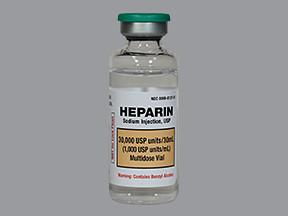
- color
- colorless
- shape
- imprint
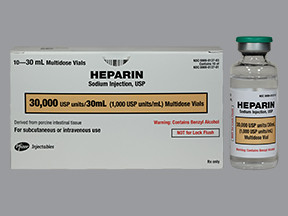
- color
- colorless
- shape
- imprint

- color
- colorless
- shape
- imprint
Reviews
Faq for HEPARIN - INJECTION
Heparin injection is used to prevent and treat blood clots in conditions such as deep vein thrombosis, pulmonary embolism, and during certain medical procedures.
Heparin works by preventing the formation of blood clots by inhibiting the activity of certain clotting factors in the blood.
Heparin can be injected into a vein (intravenous) or under the skin (subcutaneous). The route of administration is determined by the specific condition being treated.
Common side effects of heparin injection include bleeding, bruising, pain or irritation at the injection site, and changes in blood pressure. Rare but serious side effects can include allergic reactions and severe bleeding.
Heparin injection is generally considered safe to use during pregnancy. It does not cross the placenta and does not have harmful effects on the developing fetus.
Yes, heparin injection can be used in children, but the dose must be carefully adjusted based on the child's weight and condition.
Heparin should be used with caution in people with bleeding disorders, liver or kidney disease, high blood pressure, ulcers, or recent surgery. It may also interact with certain medications, so it is important to inform your healthcare provider about all the medicines you are using.
Heparin should not be used in patients with a history of HIT, as it can cause a severe immune response leading to dangerous blood clotting or bleeding.
The frequency of heparin injection administration will depend on the specific condition being treated. It is usually given multiple times per day, either every 8 or 12 hours.
Heparin injection is commonly used to prevent and treat blood clots, especially in conditions such as deep vein thrombosis (DVT), pulmonary embolism (PE), and during certain surgeries.
Heparin works by inhibiting the formation and growth of blood clots. It acts as an anticoagulant by enhancing the activity of antithrombin, a natural substance in the body that inhibits blood clotting factors.
Common side effects of Heparin injection include bleeding, bruising at the injection site, and anemia. Rare but severe side effects can include allergic reactions, thrombocytopenia (low platelet count), and osteoporosis with long-term use.
Heparin injection is usually given as an injection or infusion into a vein. It should only be administered by a healthcare professional as per the prescribed dosage and instructions.
In certain cases, patients may be prescribed a low molecular weight heparin (LMWH) version of Heparin that can be injected at home, after proper training and under the guidance of a healthcare professional.
Heparin may interact with other medications like aspirin, nonsteroidal anti-inflammatory drugs (NSAIDs), anticoagulant or antiplatelet medications, and certain herbal supplements. It is important to inform your healthcare provider about all the medications you are taking and any medical conditions you have.
Heparin is generally considered safe to use during pregnancy, especially during the first trimester. It does not pass into breast milk significantly, so it is safe to use while breastfeeding. However, it is essential to consult with a healthcare provider before using Heparin in these situations.
The duration of Heparin treatment can vary depending on the individual's condition. It may be required for a few days to several months, depending on the severity of the clotting disorder or surgical procedure.
An overdose of Heparin can lead to excessive bleeding. If an overdose is suspected, immediate medical attention should be sought.
Disclaimer
IMPORTANT: HOW TO USE THIS INFORMATION: This is a summary and does NOT have all possible information about this product. This information does not assure that this product is safe, effective, or appropriate for you. This information is not individual medical advice and does not substitute for the advice of your health care professional. Always ask your health care professional for complete information about this product and your specific health needs.
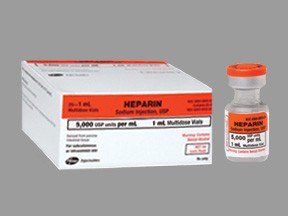
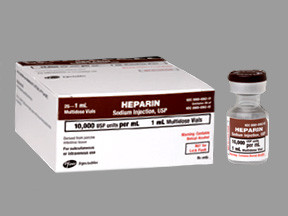
No Reviews Yet